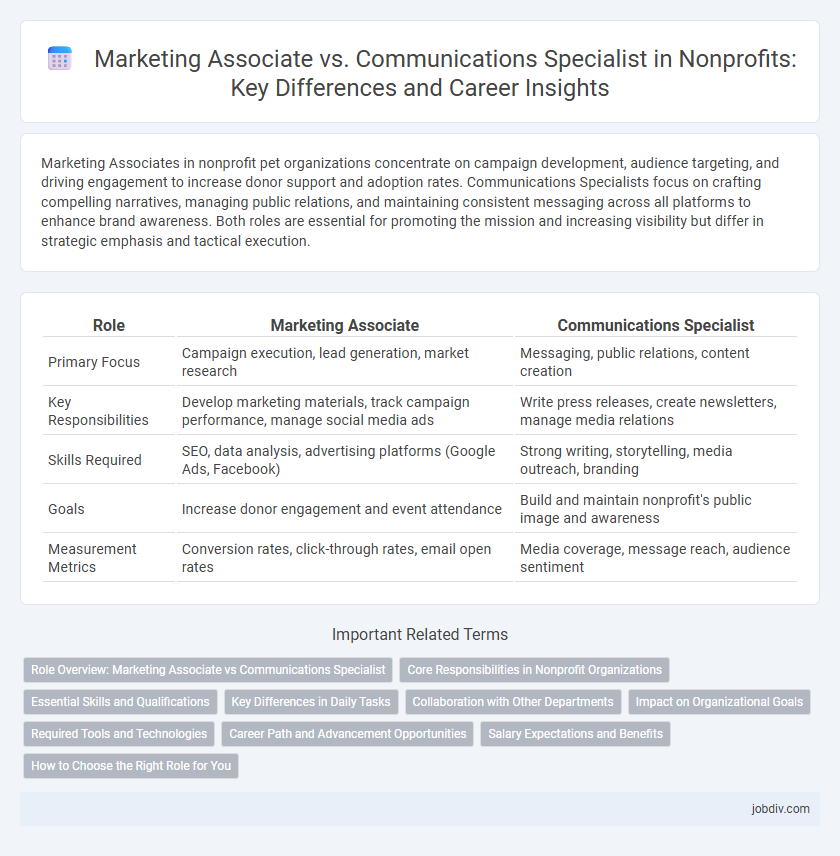Marketing Associates in nonprofit pet organizations concentrate on campaign development, audience targeting, and driving engagement to increase donor support and adoption rates. Communications Specialists focus on crafting compelling narratives, managing public relations, and maintaining consistent messaging across all platforms to enhance brand awareness. Both roles are essential for promoting the mission and increasing visibility but differ in strategic emphasis and tactical execution.
Table of Comparison
| Role | Marketing Associate | Communications Specialist |
|---|---|---|
| Primary Focus | Campaign execution, lead generation, market research | Messaging, public relations, content creation |
| Key Responsibilities | Develop marketing materials, track campaign performance, manage social media ads | Write press releases, create newsletters, manage media relations |
| Skills Required | SEO, data analysis, advertising platforms (Google Ads, Facebook) | Strong writing, storytelling, media outreach, branding |
| Goals | Increase donor engagement and event attendance | Build and maintain nonprofit's public image and awareness |
| Measurement Metrics | Conversion rates, click-through rates, email open rates | Media coverage, message reach, audience sentiment |
Role Overview: Marketing Associate vs Communications Specialist
Marketing Associates concentrate on developing and executing campaigns to promote nonprofit programs, leveraging data analysis and digital channels to boost donor engagement and event attendance. Communications Specialists manage the organization's messaging across media, crafting press releases, newsletters, and social media content to enhance public awareness and stakeholder relationships. Both roles require collaboration with fundraising teams but differ in focus: Marketing Associates drive outreach and conversion, while Communications Specialists shape and maintain the nonprofit's public image.
Core Responsibilities in Nonprofit Organizations
Marketing Associates in nonprofit organizations concentrate on developing and executing promotional campaigns to increase donor engagement and event participation, using targeted outreach and data analysis. Communications Specialists focus on crafting compelling narratives and managing public relations to enhance the nonprofit's brand reputation and stakeholder communication. Both roles collaborate closely but emphasize different core responsibilities: Marketing Associates drive strategic marketing initiatives, while Communications Specialists ensure consistent messaging and media relations.
Essential Skills and Qualifications
Marketing Associates in nonprofit organizations must excel in data analysis, digital marketing tools, and campaign coordination to effectively drive fundraising and outreach efforts. Communications Specialists require strong writing, public relations, and content creation skills to craft compelling narratives that engage donors and stakeholders. Both roles demand proficiency in social media management and collaboration across departments to amplify the nonprofit's mission and impact.
Key Differences in Daily Tasks
Marketing Associates in nonprofits focus on campaign development, audience segmentation, and data analysis to drive donor engagement and fundraising success. Communications Specialists concentrate on crafting press releases, managing social media content, and maintaining consistent messaging across platforms to enhance public relations and community outreach. While Marketing Associates use analytics and targeted strategies, Communications Specialists prioritize storytelling and media relations to support organizational goals.
Collaboration with Other Departments
Marketing Associates collaborate closely with fundraising, program, and development teams to align campaign strategies with organizational goals and donor engagement efforts. Communications Specialists work alongside external relations, volunteer coordination, and media departments to ensure consistent messaging and enhance public outreach. Both roles require cross-departmental teamwork to maximize impact and maintain cohesive nonprofit branding.
Impact on Organizational Goals
A Marketing Associate in a nonprofit focuses on driving donor engagement and fundraising campaigns through targeted outreach and data analysis, directly influencing revenue growth and resource allocation. A Communications Specialist enhances brand awareness and stakeholder relations by crafting compelling messages and managing media presence, which strengthens public trust and volunteer recruitment. Both roles uniquely contribute to achieving the nonprofit's mission by aligning communication strategies with organizational goals.
Required Tools and Technologies
Marketing Associates in nonprofits rely heavily on digital marketing platforms such as Google Analytics, HubSpot, and Mailchimp to execute campaigns and track performance metrics. Communications Specialists prioritize using media monitoring tools like Cision, social media management software such as Hootsuite or Sprout Social, and content creation tools including Canva and Adobe Creative Suite to craft compelling messaging. Both roles require proficiency in CRM systems like Salesforce or Bloomerang to manage stakeholder relationships effectively.
Career Path and Advancement Opportunities
Marketing Associates in nonprofits typically start with campaign coordination and data analysis, progressing to leadership roles such as Marketing Manager or Director by gaining skills in strategic planning and donor engagement. Communications Specialists often advance through expertise in storytelling and media relations, moving into senior positions like Communications Manager or Public Relations Director with a focus on brand development and stakeholder communication. Both career paths offer growth through specialized training in digital marketing, content creation, and nonprofit sector trends.
Salary Expectations and Benefits
Marketing Associates in nonprofits typically earn between $40,000 and $55,000 annually, with benefits such as health insurance, retirement plans, and professional development opportunities. Communications Specialists generally have higher salary expectations, ranging from $50,000 to $70,000, reflecting their strategic role in managing public relations and digital communications. Both positions offer benefits packages, but Communications Specialists may receive additional perks related to media training and crisis communication resources.
How to Choose the Right Role for You
Choosing between a Marketing Associate and a Communications Specialist in a nonprofit depends on your skills and interests; Marketing Associates focus on campaign strategies, donor engagement, and analytics, while Communications Specialists prioritize storytelling, public relations, and content creation. Assess your strengths in data-driven marketing versus creative communication to align with organizational goals effectively. Understanding these roles' impact on fundraising and community outreach helps target your career path within nonprofit marketing and communications.
Marketing Associate vs Communications Specialist Infographic

 jobdiv.com
jobdiv.com